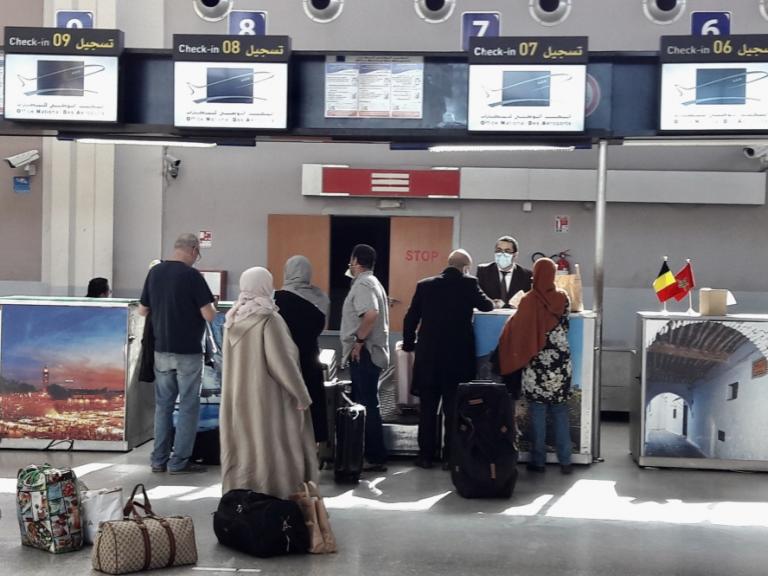-
Last updated on

© Shutterstock
Repatriation of Belgians from abroad
The Belgian embassies and consulates have repatriated thousands of Belgians from abroad in difficult circumstances. The balance is certainly positive and most Belgians are highly satisfied with the service.
Morocco was a particularly difficult case because of the large number of applications (over 6,000) in a very short time. But also because of the strict application of the medical emergency provisions and the Ramadan period. The embassy in Rabat responded quickly by deploying extra staff and setting up WhatsApp groups, a feat that was unfortunately tainted by all kinds of disinformation on social media.
Toon Nicolai (travelling in Cape Verde): 'Contact with the embassy went smoothly. We knew when a plane was coming and what we had to do. The info was to the point.'
Maryline Delvallée (travelling in Kerala, India): 'I was really delighted to work with the consul-general. He gave our case his full attention. Our warmest congratulations to the consulate-general!!'

159 volunteers have manned the crisis centre's call centre for more than 3 months. © SPF AE/FOD BZ
Key figures (situation on 15 June 2020)
11,266 Belgians repatriated, including 2,724 Belgians via flights from other EU countries
1,828 non-Belgians repatriated
47 repatriation flights were organised by Belgium, 12 flights were facilitated by Belgium
263 volunteers of whom 159 volunteers for the crisis centre’s call centre and 104 volunteers to answer questions via Facebook
41,115 calls for the crisis centre
60,000 questions treated via Facebook
Belgium seeking vaccination
Belgium has joined in the race for a coronavirus vaccine. This is thanks to a unique mix of expertise for research & development, clinical testing and production, both at universities (Ghent University, University of Antwerp, KU Leuven, ULB, etc.) and companies (Janssen Pharmaceutica, GSK, Pfizer, Ziphius Therapeutics, eTheRNA immunotherapies, Univercells, etc.).
In addition, Belgium is investing 20 million euros in a kind of "vaccinopolis", or Centre for the Evaluation of Vaccinations. The University of Antwerp and the ULB are joining forces there. Aim: to set up facilities for "controlled human infection models" (CHIM), in which healthy subjects can be tested. This vaccinopolis fills a gap in CHIM facilities in continental Europe.
Belgium also donated 5 million euros to the Coalition for Epidemic Preparedness and Innovation (CEPI), a platform of private and public actors working together to speed up the development of vaccines.
Belgians on the front line
Hans Kluge plays an important role in the management of the coronavirus crisis. After all, he is Regional Director of the World Health Organisation (WHO) for the European region. In addition to the 28 EU Member States (including the United Kingdom), this also includes the other European and Central Asian countries such as Macedonia, Kazakhstan, Russia and Turkey, together accounting for 53 countries and 900 million inhabitants.
The President of the European Commission, Ursula von der Leyen, appointed the world-renowned virologist Peter Piot(link is external) as a special advisor on issues relating to the coronavirus crisis. Piot helped to discover the Ebola virus and was the head of UNAIDS for many years.

Belgium sent humanitarian material to countries in need.
Humanitarian aid
Belgium donated an additional €22 million to tackle the coronavirus in humanitarian crises. Our country is also organising flights to send humanitarian equipment to countries in need.
Development Cooperation
The Belgian Development Agency Enabel has reoriented running programmes to support the partner countries in the coronavirus crisis. A further €6 million was added through redeployment. Non-government bodies such as NGOs, trade unions and research institutions (Institute of Tropical Medicine, etc.) are also making serious efforts.

Enabel helped Uganda spread messages about COVID-19. © Enabel
Team Europe
Belgium is joining Team Europe. This is how the European Union is aiming to combine all its external actions to help partners overcome the coronavirus crisis. So far, Team Europe has reached an important critical mass of €36 billion.
Multilateral approach
Belgium fully supports the multilateral approach. At a global level, the fight against the pandemic is broadly in the hands of: the World Health Organisation (WHO) for the health dimension, the UN Office for the Co-ordination of Humanitarian Aid (OCHA) for humanitarian aid, the UN Food and Agriculture Organisation (FAO) for food security and the International Monetary Fund (IMF) and the World Bank for the socio-economic consequences.
More on Corona crisis

How do you repatriate 11,266 Belgian citizens?
Due to the coronavirus crisis, thousands of Belgians were all of a sudden stranded abroad. Three months later, the FPS Foreign A...
Mali: Food security increased in light of the COVID-19 pandemic
Belgium has donated 250,000 dollars to improve the food security of 1,270 vulnerable Malian families.

How our post in Rabat faced a crisis of unprecedented proportions
At the end of March, the world froze. States decided, among other measures, to close their borders to prevent the uncontrolled s...
